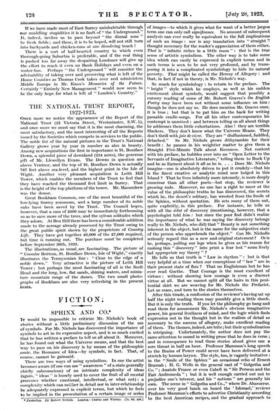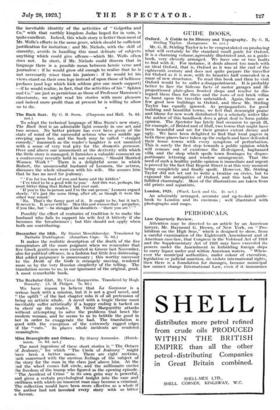FICTION:
SPHINX AND CO.*
IT would be impossible to criticize Mr. Nichols's book of stories without a little preliminary discussion of the use of symbols. For Mr. Nichols has discovered the importance of symbols to art in its expressive aspect, and is so much excited that he has written a preface to tell us all about it. MoreoVer, he has found out what the Universe means, and that the best way to pass on his discovery is by means of the philosophic conk., the Romance of Idea—by symbols, in fact. That, of course, cannot be gainsaid.
There are two ways of using symbolism. In one the artist becomes aware (if one can use " awareness " of a state generally chiefly subconscious) of an intricate complexity of ideas (again, " ideas " is loosely used to cover the fruit of all mental processes whether emotional, intellectual, or what not) : a complexity which can neither in detail nor in inter-relationship be adequately expressed in explicit terms, but which he feels to be implied in the presentation of a certain image or series
• Fantastiea. By Robert Nichols. London : Chatto and Windus. [7s. 8d. net.]
of images—to which it gives what for want of a better jargon term one can only call significance. No amount of subsequent
analysis can ever really be equivalent to the full implications of such an image : nor is any translation into " straight '! thought necessary for the reader's appreciation of them either.
That is " infinite riches in a little room " : that is the true
sense of artistic symbolism. The other way is to take some idea which can easily be expressed in explicit terms and in
such terms is seen to be not very profound, and by trans- posing it into a complicated symbolology to hide its natural poverty. That might be called the Heresy of Allegory : and that, in fact if not in theory, is Mr. Nichols's way.
So much for symbolology : to return to the preface. The " bright " style which he employs, as well as his sudden excitement about symbols, would suggest that possibly a cursory reading of some of Mr. Robert Graves's On English Poetry may have been not without some influence on him ; though he does•not say so. He does mention Mr. Graves once, it is true ; but that is to pat him on the back for writing passable cradle-songs. For all his other contemporaries his contempt is unmixed : and between telling us all about things he addresses them little exhortations. Alas ! they are terrible Slackers. They don't know what the Universe Means. They don't thrill with joie de vim. They are " disillusioned, fuddled, detached." So Mr. Nichols grows dithyrambic for their benefit : he pauses in his weightier matter to give them a Straight Five-Minute Talk about Keenness. Not content with his preface, he bubbles over into an " Open Letter to the Servants of Imaginative Literature," telling them to Buck Up and be as Earnest about it all as he is. . . . Does Mr. Nichols imagine—one is absolutely driven to put it crudely—that his is the finest creative or analytic mind now lodged in this Island ? That he lives infinitely more intensely, is more deeply conscious than all other poets—but stop, the reviewer is growing rude. Moreover, no one has a right to sneer at the value of the philosophic truths he has discovered, the secrets which he, the desert's solitary, has wrested from the Smile of the Sphinx, without quotation. He sets many of them out, quite explicitly, in this preface. For instance, he tells us with all the éclat of discovery (mentioning, however, that a psychologist told him : but since the poor fool didn't realize the importance of what he was saying the discovery belongs really to Mr. Nichols, who did) that " Beauty is not something inherent in the object, but is the name for the subjective state of the person who apprehends the object." Can Mr. Nicholls seriously regard this as a new and original statement? Or is he, perhaps, pulling our legs when he gives as his reason for rushing this " discovery" into print a fear lest " some lively lad appropriate my theory " ?
He tells us that •truth is " Law in rhythm " : but is tliat very helpful at a time when our conceptions of " law " are in their present state of flux ? That no Englishman but lie has ever read Goethe. That Courage is the most excellent of virtues : without showing how courage is even a discreet virtue at all. But we cannot split all the hairs in this peni- tential shirt we are weaving for Mr. Nichols the Prefacist. Let us cease, and turn to the stories themselves.
After this tirade, a confession of the reviewer's having sat up half the night reading them may possibly give a little shock. But it is only the truth. If you let the philosophy go hang and read them for amusement Mr. Nichols's obvious imaginative power, his general liveliness of mind, and the logic which finds expression not in the thought but in the realism of detail so necessary to the success of allegory, make excellent reading of them. The themes, indeed, are trite; but their symbolization is intriguing. Unfortunately, the author does not pay the same attention to sound in writing prose that he does in verse ; and in consequence to read these stories aloud gives one a sore throat in half an hour. Professor Mammon's long speech to the Brains of Power could never have been delivered at a stretch by human larynx. The style, too, is vaguely imitative : in the " Smile of the Sphinx " an occasional echo of Ernest Bramah ; H. G. Wells in the general cast of " Golgotha and Co. " ; Anatole France or even Cabell in " Sir Perseus and the Fair Andromeda " ; but it is well enough carried out not to prejudice one's interest, and his " notions " are generally his own. The scene in " Golgotha and Co.," where Dr. Ahasuerus, over his very good lunch on board the ' Ishmael,' reviews Professor Mammon's efforts to advertise Christianity according to the best American recipes, and the gradual approach to the inevitable identity of the activities of " Golgotha and Co." with that earthly kingdom Judas hoped for in vain, is quite excellent. Indeed, this whole story is better than most of Mr. Wells's efforts in the same genre, which should be sufficient justification for imitation ; and Mr. Nichols, with the skill of sincerity, avoids in handling this most delicate of subjects anything which could give offence—which Mr. Wells often does not. In short, if Mr. Nichols could discern that in language there is a possible mean between heroic verse and journalese : if he would grow old enough to realize that he is not necessarily wiser than his juniors : if he would let his views stand on their own legs instead of upon those of bellicose prefaces (and legs which kick seldom give one much support) —if he would realize, in fact, that the activities of his " Sphinx and Co." are just as pernicious as those of Professor Mammon's directorate, we might read his stories with more pleasure and indeed more profit than at present he is willing to allow us to do.







































 Previous page
Previous page